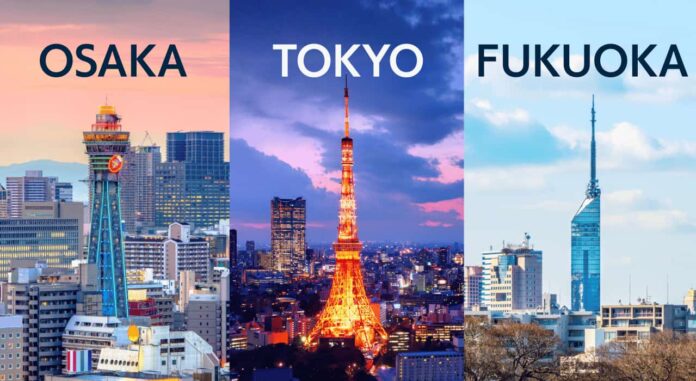Is living in Japan more expensive than expected — or surprisingly affordable?
For foreigners hoping to live and work in Japan, living costs are a major concern.
The cost of living varies across Japan’s major cities: Tokyo, the central hub for careers; Osaka, the economic heart of Western Japan; and Fukuoka, a rapidly rising popular destination.
You may have heard things like:
“Tokyo is super expensive!”
“Is it really that much cheaper in the other cities?”
In this article, we’ll explore the real cost of living in those cities for a single person.
1. Comparison of Major Cities: Features and Livability
When choosing a place to live in Japan, foreign residents often compare the “Big Three” cities. Here is a comparison focusing on their distinct characteristics, livability, and how they relate to the cost of living.
Tokyo: The Global Hub where everything is available, but the cost is supreme.
Osaka: The Heart of the Kansai region, maintaining Tokyo’s convenience with added warmth and affordability.
Fukuoka: The Popular Choice for a Low-Cost, Comfortable, and Compact City Lifestyle.
2. Breakdown of Monthly Expenses by Category

① Rent
Rent is often the biggest monthly expense. Prices vary greatly depending on location and property type.
| Location | 1Room/1Bed room (Single) | 2–3Bed room (Family) |
|---|---|---|
| Tokyo(23wards) | ¥70,000–¥200,000 | ¥200,000–¥550,000 |
| Tokyo(suburbs) | ¥50,000–¥110,000 | ¥100,000–¥220,000 |
| Osaka(center) | ¥65,000–¥120,000 | ¥150,000–¥200,000 |
| Osaka(suburbs) | ¥45,000–¥90,000 | ¥90,000–¥175,000 |
| Fukuoka(center) | ¥55,000–¥90,000 | ¥120,000–¥170,000 |
| Fukuoka(suburbs) | ¥40,000–¥55,000 | ¥80,000–¥120,000 |
| Regional cities | ¥40,000–¥80,000 | ¥70,000–¥150,000 |
⚠️ Note: Initial move-in costs in Japan are high. Deposit (shikikin), key money (reikin), and agency fees can add up to 4–6 months’ rent upfront.
💡 Tip: Some employers offer company housing or subsidies, which can reduce your cost significantly.
② Food
- If you cook at home, it’s possible to keep food expenses to ¥20,000–¥30,000 per month.
- If you eat out frequently, that can rise to ¥40,000–¥60,000.
⚠️ Note: Convenience store meals are easy but more expensive.
💡 Tip: Buying discounted vegetables and meat at supermarkets is a great way to save.
③ Utilities & Internet
- Electricity, gas, and water combined usually cost around ¥10,000–¥15,000/month.
- Internet plans typically range from ¥4,000–¥6,000/month.
⚠️ Note: Be aware that energy bills increase in summer and winter due to air conditioning and heating.
④ Transportation
- In cities, commuting costs are often covered by companies via commuter passes.
- In rural areas, a car may be necessary, which adds gasoline, parking, and insurance costs.
💡 Tip: Biking to work or using car-sharing services can significantly reduce costs.
⑤ Other (daily goods, insurance, leisure, etc.)
- Daily necessities (detergent, toilet paper, etc.): ¥3,000–¥5,000/month
- Health insurance and pension:
– For company employees: deducted from salary
– For freelancers: national health and pension plans total around ¥20,000–¥30,000/month - Entertainment and social expenses vary, but the average is around ¥20,000–¥30,000/month
For more detailed information, the following sites may be helpful:
– Cost of living: NUMBEO
– Regional rent averages: SUUMO
3. Sample Monthly Budgets: Realistic Living Scenarios

Case 1: Living in Tokyo, single, mostly home-cooked meals
- Rent: ¥80,000
- Food: ¥35,000
- Utilities & Internet: ¥15,000
- Other: ¥25,000
Total: ¥155,000/month
Case 2: Living in Tokyo, eats out often, active social life
- Rent: ¥90,000
- Food: ¥50,000
- Utilities & Internet: ¥20,000
- Entertainment & social expenses: ¥40,000
Total: ¥200,000/month
Case 3: Living in a regional city, mostly home-cooked meals, owns a car
- Rent: ¥55,000
- Food: ¥30,000
- Utilities & Internet: ¥15,000
- Car-related expenses: ¥20,000
- Other: ¥20,000
Total: ¥140,000/month
4. Tips for Saving Money in Japan
- Furnished shared houses help reduce both rent and initial move-in costs.
- Use budgeting apps and point reward systems (like Rakuten Points) to cut daily expenses.
- Buy used items through flea market apps like Mercari.
- Tap into local nonprofit organizations or support groups for foreigners — some offer free advice or even material support.
5. Summary: Your Budget Depends on Where and How You Live
- The average monthly cost of living for a single person in Japan is around ¥150,000–¥170,000.
- If you live frugally, it’s possible to manage on ¥100,000–¥130,000/month.
- If you enjoy dining out and hobbies in Tokyo, expect to spend over ¥200,000/month.
You may feel that “Living in Japan seems expensive…” But your lifestyle has a huge impact.
With the right planning and information, living in Japan can be not only affordable, but very comfortable.
Source: Statistics Bureau of Japan
Interested in IT-related opportunities in Japan?
💻 Check out our job board for the latest openings!
👀 Follow us on Linkedin to stay updated!
















